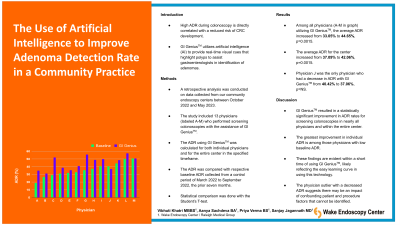Sunday Poster Session
Category: Colorectal Cancer Prevention
P0351 - The Use of Artificial Intelligence to Improve Adenoma Detection Rate in a Community Practice
Sunday, October 22, 2023
3:30 PM - 7:00 PM PT
Location: Exhibit Hall

Has Audio

Vibhuti Khatri, MBBS
Wake Endoscopy Center
Raleigh, NC
Presenting Author(s)
Vibhuti Khatri, MBBS, Aanya Sachdeva, BA, Priya Verma, BS, Sanjay Jagannath, MD
Wake Endoscopy Center, Raleigh, NC
Introduction: Adenoma detection rate (ADR) is a critical quality metric in colonoscopies, directly linked to the prevention of colorectal cancer. High ADR during colonoscopy is directly correlated with a reduced risk of CRC development.1 GI GeniusTM is an emerging, computer-aided polyp detection system designed to assist gastroenterologists in identification of adenomas.2 The system utilizes artificial intelligence (AI) to provide real-time visual cues that highlight polyps with the goal of improving ADR. This study aims to evaluate the impact of GI GeniusTM on ADR in a community GI practice that recently implemented the technology.
Methods: A retrospective analysis was conducted on data collected from our community endoscopy centers between October 2022 and May 2023. The study included 13 physicians (labeled A-M) who performed screening colonoscopies with the assistance of GI Genius. The ADR using GI Genius was calculated for both individual physicians and for the entire center in the specified timeframe and compared with respective baseline ADR collected from a control period of March 2022 to September 2022, the prior seven months. Statistical comparison was done with the Student’s T- test.
Results: Graph 1 shows the ADR of all physicians. Among all physicians (A-M) using GI GeniusTM, the average ADR amongst all physicians utilizing the tool increased from 33.05% to 44.65%, p=0.0015. The average ADR for the center increased from 37.09% to 42.06%, p=0.0015. Physician J was the only physician who had a decrease in ADR with GI GeniusTM from 40.42% to 37.06, p=NS.
Discussion: The incorporation of GI GeniusTM resulted in a statistically significant improvement in ADR rates for screening colonoscopies in nearly all physicians and within the entire community based endoscopy center. The greatest improvement in individual ADR is among those physicians with low baseline ADR. These statistically significant findings are evident within a short time of using GI GeniusTM, likely reflecting the easy learning curve in using this technology. The physician outlier with a decreased ADR suggests there may be an impact of confounding patient and procedure factors that cannot be identified. Additional study of the impact of these variables on ADR as well as the clinical significance of GI Genius is warranted to further examine these results.

Disclosures:
Vibhuti Khatri, MBBS, Aanya Sachdeva, BA, Priya Verma, BS, Sanjay Jagannath, MD. P0351 - The Use of Artificial Intelligence to Improve Adenoma Detection Rate in a Community Practice, ACG 2023 Annual Scientific Meeting Abstracts. Vancouver, BC, Canada: American College of Gastroenterology.
Wake Endoscopy Center, Raleigh, NC
Introduction: Adenoma detection rate (ADR) is a critical quality metric in colonoscopies, directly linked to the prevention of colorectal cancer. High ADR during colonoscopy is directly correlated with a reduced risk of CRC development.1 GI GeniusTM is an emerging, computer-aided polyp detection system designed to assist gastroenterologists in identification of adenomas.2 The system utilizes artificial intelligence (AI) to provide real-time visual cues that highlight polyps with the goal of improving ADR. This study aims to evaluate the impact of GI GeniusTM on ADR in a community GI practice that recently implemented the technology.
Methods: A retrospective analysis was conducted on data collected from our community endoscopy centers between October 2022 and May 2023. The study included 13 physicians (labeled A-M) who performed screening colonoscopies with the assistance of GI Genius. The ADR using GI Genius was calculated for both individual physicians and for the entire center in the specified timeframe and compared with respective baseline ADR collected from a control period of March 2022 to September 2022, the prior seven months. Statistical comparison was done with the Student’s T- test.
Results: Graph 1 shows the ADR of all physicians. Among all physicians (A-M) using GI GeniusTM, the average ADR amongst all physicians utilizing the tool increased from 33.05% to 44.65%, p=0.0015. The average ADR for the center increased from 37.09% to 42.06%, p=0.0015. Physician J was the only physician who had a decrease in ADR with GI GeniusTM from 40.42% to 37.06, p=NS.
Discussion: The incorporation of GI GeniusTM resulted in a statistically significant improvement in ADR rates for screening colonoscopies in nearly all physicians and within the entire community based endoscopy center. The greatest improvement in individual ADR is among those physicians with low baseline ADR. These statistically significant findings are evident within a short time of using GI GeniusTM, likely reflecting the easy learning curve in using this technology. The physician outlier with a decreased ADR suggests there may be an impact of confounding patient and procedure factors that cannot be identified. Additional study of the impact of these variables on ADR as well as the clinical significance of GI Genius is warranted to further examine these results.

Figure: Physician baseline ADR compared to GI Genius ADR
Disclosures:
Vibhuti Khatri indicated no relevant financial relationships.
Aanya Sachdeva indicated no relevant financial relationships.
Priya Verma indicated no relevant financial relationships.
Sanjay Jagannath indicated no relevant financial relationships.
Vibhuti Khatri, MBBS, Aanya Sachdeva, BA, Priya Verma, BS, Sanjay Jagannath, MD. P0351 - The Use of Artificial Intelligence to Improve Adenoma Detection Rate in a Community Practice, ACG 2023 Annual Scientific Meeting Abstracts. Vancouver, BC, Canada: American College of Gastroenterology.
